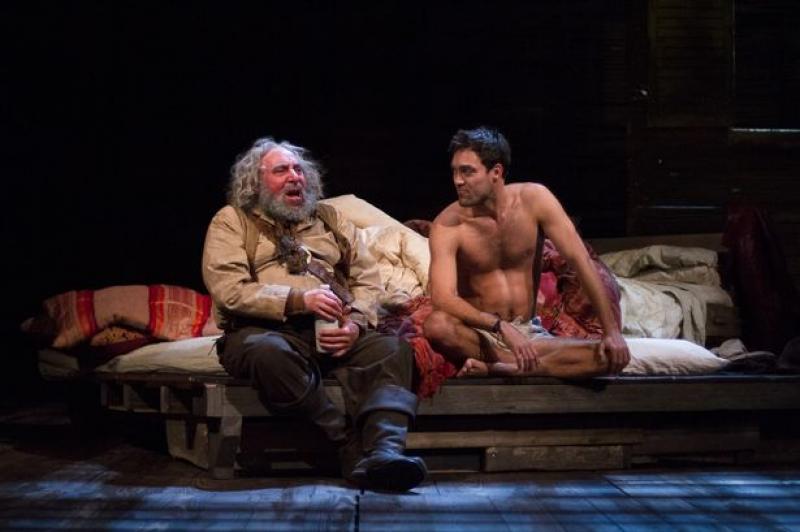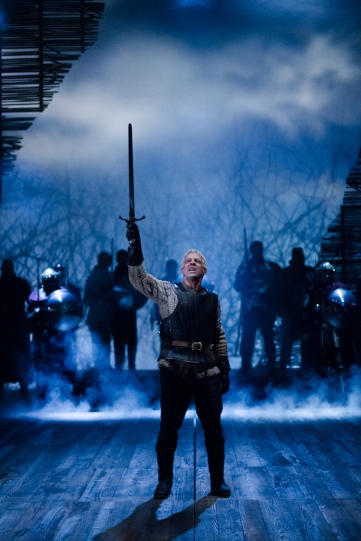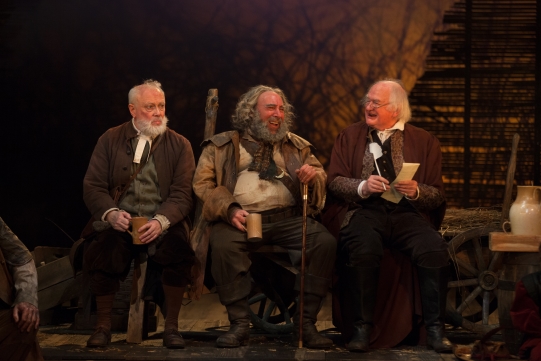Henry IV, Parts One and Two, RSC, Barbican | reviews, news & interviews
Henry IV, Parts One and Two, RSC, Barbican
Henry IV, Parts One and Two, RSC, Barbican
A charmless Falstaff and two blunt young blades in mediocre Shakespeare double bill

Heritage Shakespeare for the home counties and the tourists is just about alive but not very well at the Royal Shakespeare Company. If that sounds condescending, both audiences deserve better, and get it at Shakespeare’s Globe, where the verse-speaking actually means something and the communication is much more urgent.
That was pacy, drew its actors from diverse theatrical or television backgrounds into a true ensemble and followed through its women’s-prison setting to brilliant, touching and often very funny effect. This one lacks pace, has poor verse-speaking not least from some minor performances you’d be ashamed to see on an amateur stage and is "as tedious as a tired horse", as Hotspur says here of Owen Glendower. I’d gladly have exchanged his nine hours’ conference with the six which weighed ever heavier yesterday.
Catastrophically, there’s not a single performance among the leads to win allegiance. Falstaff needs to charm early on so that we can be repelled by his bad behaviour on the Shrewsbury battlefield and his nastiness chez Justice Shallow. Timothy West brought tears to the eyes from the start in a very traditional English Touring Theatre production; in Lloyd’s Donmar entertainment, I warmed to Ashley McGuire‘s rogue by the time of the charade at Gadshill, where the prince and his pal terrorise her by popping a red balloon ("no, no, not the balloon" muttered this Falstaff in his sleep behind the arras). That scene is horribly botched here, where an inappropriate burst of diddly-diddly folk music in Paul Englishby’s predictable and over-amplified score marks the robbery and where Falstaff simply walks offstage after the attack.
 Not that Antony Sher’s Falstaff has us on his side by then. He’s a rather horrid old man; the delivery is slow and deliberate, marred above all by word-gargling which might have been established in the first scene with his beloved prince Hal and then abandoned. It isn’t, though we treasure the few moments like the “honour” speech or the awareness of ageing where the gargling stops. My companion wasn't there to see either, having left at the first interval clutching his throat from the transferred pain of all that dalek-speak.
Not that Antony Sher’s Falstaff has us on his side by then. He’s a rather horrid old man; the delivery is slow and deliberate, marred above all by word-gargling which might have been established in the first scene with his beloved prince Hal and then abandoned. It isn’t, though we treasure the few moments like the “honour” speech or the awareness of ageing where the gargling stops. My companion wasn't there to see either, having left at the first interval clutching his throat from the transferred pain of all that dalek-speak.
No-one else is going to step in and charm us instead. Alex Hassell’s Hal is fine of form, discovered in bed with two whores and Falstaff at the foot, but weak of voice (from what little we get to hear of his companion Poins, Sam Marks would have made a more appropriate prince). Hassell imbues the soliloquies with some meaning, but you can see the cogs going round. Relatively unintelligible is Trevor White’s Hotspur (pictured, above). There were inevitable comparisons with the way Jade Anouka at the Donmar conjured the image of a gifted but over-impetuous south London youth; White has nothing of the adolescent about him and is never physically relaxed, despite a few moments where the coiled spring leaps into action, just a sour bully and a wife-abuser. That leaves the King, not often present in Part One but an essential authority (two words: Harriet Walter). Jasper Britton seems to be suffering a charisma bypass from the start, and in his later deathbed scene shrivels to the alienating role of a decrepit whiner.
 If none of the verse-speakers is a patch on Lloyd’s Worcester in the Donmar production, Ann Ogbomo, there’s small compensation in the prosers. Paola Dionisotti’s Mistress Quickly is inclined to mug when she has little to say in the first big Eastcheap scene, but zooms spiritedly into focus alongside Joshua Richards’ po-faced Bardolph, a lesson in economy (he also gives us a strong Glendower). Nia Gwynne’s Doll Tearsheet is a plausible mixed-up girl in a Part Two Eastcheap scene more real than any in Part One – though the entrance of Antony Byrne’s Pistol, mixed-up only in the indeterminate characterization of the classics-quoting roaring boy, nearly scuppers it. Byrne also plays Rumour in the production’s only concession to the 21st century.
If none of the verse-speakers is a patch on Lloyd’s Worcester in the Donmar production, Ann Ogbomo, there’s small compensation in the prosers. Paola Dionisotti’s Mistress Quickly is inclined to mug when she has little to say in the first big Eastcheap scene, but zooms spiritedly into focus alongside Joshua Richards’ po-faced Bardolph, a lesson in economy (he also gives us a strong Glendower). Nia Gwynne’s Doll Tearsheet is a plausible mixed-up girl in a Part Two Eastcheap scene more real than any in Part One – though the entrance of Antony Byrne’s Pistol, mixed-up only in the indeterminate characterization of the classics-quoting roaring boy, nearly scuppers it. Byrne also plays Rumour in the production’s only concession to the 21st century.
The Gloucestershire justices, Oliver Ford-Davies’s Shallow and Jim Hooper’s Silence (pictured with Sher, above), promise to bring the second half of the second part to life, and I actually laughed when Ford-Davies evoked Shallow’s night with Falstaff and Jane Nightwork, one of Shakespeare’s proto-Carry On gallery of Anglo-Saxon names elsewhere conjured with so little relish here. But that rural scene is blemished by stereotypical parody in the parade of cannon-fodder recruits, which ought to be shocking as well as funny. Search me why one of the freaks wears green make-up, and getting a laugh out of the little hunchback is beyond the pale.
Another saving grace here is the ease with which Tim Mitchell’s lighting conjures the outdoors on Stephen Brimson Lewis’s practical set, with its broken slats conveying the deracinaton that’s not conveyed by the acting. It’s an open space for good strong performances to come to the fore, but here there’s none powerful or significant enough to keep a mounting feeling of despair at bay. Every schoolchild in the country should get to see Lloyd's Donmar Henry IV; this one might be a turn-off for life. The only consolation after a horrible Saturday for me is that if Doran and some of his company are available to move on to a Henry V, I'll make sure I'm not available to see it.
rating
Share this article
Add comment
The future of Arts Journalism
You can stop theartsdesk.com closing!
We urgently need financing to survive. Our fundraising drive has thus far raised £49,000 but we need to reach £100,000 or we will be forced to close. Please contribute here: https://gofund.me/c3f6033d
And if you can forward this information to anyone who might assist, we’d be grateful.

Subscribe to theartsdesk.com
Thank you for continuing to read our work on theartsdesk.com. For unlimited access to every article in its entirety, including our archive of more than 15,000 pieces, we're asking for £5 per month or £40 per year. We feel it's a very good deal, and hope you do too.
To take a subscription now simply click here.
And if you're looking for that extra gift for a friend or family member, why not treat them to a theartsdesk.com gift subscription?
more Theatre
 The Maids, Donmar Warehouse review - vibrant cast lost in a spectacular-looking fever dream
Kip Williams revises Genet, with little gained in the update except eye-popping visuals
The Maids, Donmar Warehouse review - vibrant cast lost in a spectacular-looking fever dream
Kip Williams revises Genet, with little gained in the update except eye-popping visuals
 Ragdoll, Jermyn Street Theatre review - compelling and emotionally truthful
Katherine Moar returns with a Patty Hearst-inspired follow up to her debut hit 'Farm Hall'
Ragdoll, Jermyn Street Theatre review - compelling and emotionally truthful
Katherine Moar returns with a Patty Hearst-inspired follow up to her debut hit 'Farm Hall'
 Troilus and Cressida, Globe Theatre review - a 'problem play' with added problems
Raucous and carnivalesque, but also ugly and incomprehensible
Troilus and Cressida, Globe Theatre review - a 'problem play' with added problems
Raucous and carnivalesque, but also ugly and incomprehensible
 Clarkston, Trafalgar Theatre review - two lads on a road to nowhere
Netflix star, Joe Locke, is the selling point of a production that needs one
Clarkston, Trafalgar Theatre review - two lads on a road to nowhere
Netflix star, Joe Locke, is the selling point of a production that needs one
 Ghost Stories, Peacock Theatre review - spirited staging but short on scares
Impressive spectacle saves an ageing show in an unsuitable venue
Ghost Stories, Peacock Theatre review - spirited staging but short on scares
Impressive spectacle saves an ageing show in an unsuitable venue
 Hamlet, National Theatre review - turning tragedy to comedy is no joke
Hiran Abeyeskera’s childlike prince falls flat in a mixed production
Hamlet, National Theatre review - turning tragedy to comedy is no joke
Hiran Abeyeskera’s childlike prince falls flat in a mixed production
 Rohtko, Barbican review - postmodern meditation on fake and authentic art is less than the sum of its parts
Łukasz Twarkowski's production dazzles without illuminating
Rohtko, Barbican review - postmodern meditation on fake and authentic art is less than the sum of its parts
Łukasz Twarkowski's production dazzles without illuminating
 Lee, Park Theatre review - Lee Krasner looks back on her life as an artist
Informative and interesting, the play's format limits its potential
Lee, Park Theatre review - Lee Krasner looks back on her life as an artist
Informative and interesting, the play's format limits its potential
 Measure for Measure, RSC, Stratford review - 'problem play' has no problem with relevance
Shakespeare, in this adaptation, is at his most perceptive
Measure for Measure, RSC, Stratford review - 'problem play' has no problem with relevance
Shakespeare, in this adaptation, is at his most perceptive
 The Importance of Being Earnest, Noël Coward Theatre review - dazzling and delightful queer fest
West End transfer of National Theatre hit stars Stephen Fry and Olly Alexander
The Importance of Being Earnest, Noël Coward Theatre review - dazzling and delightful queer fest
West End transfer of National Theatre hit stars Stephen Fry and Olly Alexander
 Get Down Tonight, Charing Cross Theatre review - glitz and hits from the 70s
If you love the songs of KC and the Sunshine Band, Please Do Go!
Get Down Tonight, Charing Cross Theatre review - glitz and hits from the 70s
If you love the songs of KC and the Sunshine Band, Please Do Go!
 Punch, Apollo Theatre review - powerful play about the strength of redemption
James Graham's play transfixes the audience at every stage
Punch, Apollo Theatre review - powerful play about the strength of redemption
James Graham's play transfixes the audience at every stage

Comments
Wouldn't want to be at your
You generally do better than
I'm glad I'm not the only one
Did we see the same
Agree. It reminded me of
We’ve just had the
We’ve just had the opportunity to see these productions at BAM in the US, and this comment of Mr. Nice’s struck me particularly: “It’s an open space for good strong performances to come to the fore, but here there’s none powerful or significant enough to keep a mounting feeling of despair at bay.” Our own mounting feeling of unease, if not despair, had also to do with the director’s monumentally flawed conception. In this director’s hands, the hugely imbalanced focus on low comedy reduced all else to intrusion, blunting, if not altogether obliterating, the impact of Shakespeare’s meditations on the burdens of power. Audience responses confirmed our view. Laughter even rang out in the hall when Hal, at Henry IV’s bedside, donned the crown. The greatest travesty of all was not an unintended side effect, however, but a conscious directing choice: Henry IV delivered his nighttime soliloquy not alone, but in the tavern. Mistress Quickly, behind him, slept in a chair, and, in the midst of that exquisite soliloquy, erupted with a snore.